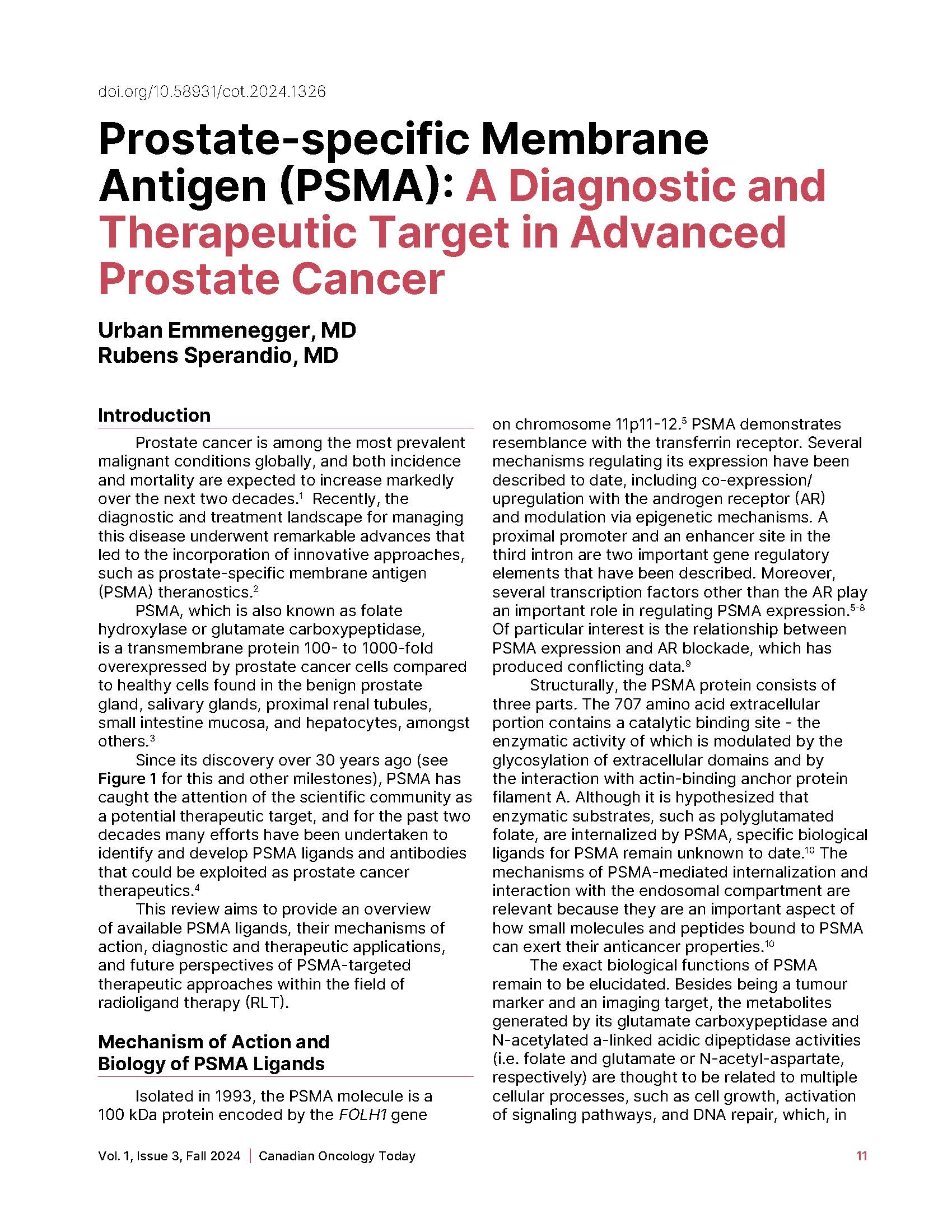Prostate-specific Membrane Antigen (PSMA): A Diagnostic and Therapeutic Target in Advanced Prostate Cancer
DOI:
https://doi.org/10.58931/cot.2024.1326Abstract
Prostate cancer is among the most prevalent malignant conditions globally, and both incidence and mortality are expected to increase markedly over the next two decades. Recently, the diagnostic and treatment landscape for managing this disease underwent remarkable advances that led to the incorporation of innovative approaches, such as prostate-specific membrane antigen (PSMA) theranostics.
PSMA, which is also known as folate hydroxylase or glutamate carboxypeptidase, is a transmembrane protein 100- to 1000-fold overexpressed by prostate cancer cells compared to healthy cells found in the benign prostate gland, salivary glands, proximal renal tubules, small intestine mucosa, and hepatocytes, amongst others.
Since its discovery over 30 years ago (see Figure 1 for this and other milestones), PSMA has caught the attention of the scientific community as a potential therapeutic target, and for the past two decades many efforts have been undertaken to identify and develop PSMA ligands and antibodies that could be exploited as prostate cancer therapeutics.
This review aims to provide an overview of available PSMA ligands, their mechanisms of action, diagnostic and therapeutic applications, and future perspectives of PSMA-targeted therapeutic approaches within the field of radioligand therapy (RLT).
References
James ND, Tannock I, N’Dow J, Feng F, Gillessen S, Ali SA, et al. The Lancet Commission on prostate cancer: planning for the surge in cases. Lancet. 2024;S0140673624006512.
Tilki D, van den Bergh RCN, Briers E, Van den Broeck T, Brunckhorst O, Darraugh J, et al. EAU-EANM-ESTRO-ESUR-ISUP-SIOG Guidelines on Prostate Cancer. Part II-2024 Update: Treatment of Relapsing and Metastatic Prostate Cancer. Eur Urol. 2024;S0302-2838(24)02306-6.
Kinoshita Y, Kuratsukuri K, Landas S, Imaida K, Rovito PM, Wang CY, et al. Expression of prostate-specific membrane antigen in normal and malignant human tissues. World J Surg. 2006;30(4):628–36.
Mattana F, Muraglia L, Barone A, Colandrea M, Saker Diffalah Y, Provera S, et al. Prostate-Specific Membrane Antigen-Targeted Therapy in Prostate Cancer: History, Combination Therapies, Trials, and Future Perspective. Cancers. 2024;16(9):1643.
O’Keefe DS, Su SL, Bacich DJ, Horiguchi Y, Luo Y, Powell CT, et al. Mapping, genomic organization and promoter analysis of the human prostate-specific membrane antigen gene. Biochim Biophys Acta. 1998;1443(1–2):113–27.
Watt F, Martorana A, Brookes DE, Ho T, Kingsley E, O’Keefe DS, et al. A tissue-specific enhancer of the prostate-specific membrane antigen gene, FOLH1. Genomics. 2001;73(3):243–54.
Peng W, Guo L, Tang R, Liu X, Jin R, Dong JT, et al. Sox7 negatively regulates prostate-specific membrane antigen (PSMA) expression through PSMA-enhancer. The Prostate. 2019;79(4):370–8.
Yin L, Rao P, Elson P, Wang J, Ittmann M, Heston WDW. Role of TMPRSS2-ERG gene fusion in negative regulation of PSMA expression. PloS One. 2011;6(6):e21319.
Emmett L, Yin C, Crumbaker M, Hruby G, Kneebone A, Epstein R, et al. Rapid Modulation of PSMA Expression by Androgen Deprivation: Serial 68Ga-PSMA-11 PET in Men with Hormone-Sensitive and Castrate-Resistant Prostate Cancer Commencing Androgen Blockade. J Nucl Med Off Publ Soc Nucl Med. 2019;60(7):950–4.
Denmeade SR. Resolute Progress Down a Long and Winding Road Leads to the Promised Land of Prostate-Specific Membrane Antigen–Based Therapies for Prostate Cancer. J Clin Oncol. 2024;42(7):852–6.
Wright GL, Haley C, Beckett ML, Schellhammer PF. Expression of prostate-specific membrane antigen in normal, benign, and malignant prostate tissues. Urol Oncol. 1995;1(1):18–28.
Schaeffer EM, Srinivas S, Adra N, An Y, Bitting R, Chapin B, et al. Prostate Cancer, Version 3.2024. J Natl Compr Cancer Netw JNCCN. 2024;22(3):140–50.
Bennett R, Li E, Ho AY, Aguiar J, Mahenthiran AK, Kumar S, et al. Patterns of PSMA PET/CT scan usage for initial staging and recurrence in a multi-centered hospital system. J Clin Oncol. 2024;42(4_suppl):36–36.
Morris MJ, Rowe SP, Gorin MA, Saperstein L, Pouliot F, Josephson D, et al. Diagnostic Performance of 18F-DCFPyL-PET/CT in Men with Biochemically Recurrent Prostate Cancer: Results from the CONDOR Phase III, Multicenter Study. Clin Cancer Res Off J Am Assoc Cancer Res. 2021;27(13):3674–82.
Fendler WP, Calais J, Eiber M, Flavell RR, Mishoe A, Feng FY, et al. Assessment of 68Ga-PSMA-11 PET Accuracy in Localizing Recurrent Prostate Cancer: A Prospective Single-Arm Clinical Trial. JAMA Oncol. 2019;5(6):856–63.
Seifert R, Emmett L, Rowe SP, Herrmann K, Hadaschik B, Calais J, et al. Second Version of the Prostate Cancer Molecular Imaging Standardized Evaluation Framework Including Response Evaluation for Clinical Trials (PROMISE V2). Eur Urol. 2023;83(5):405–12.
Werner RA, Hartrampf PE, Fendler WP, Serfling SE, Derlin T, Higuchi T, et al. Prostate-specific Membrane Antigen Reporting and Data System Version 2.0. Eur Urol. 2023;84(5):491–502.
Kuo PH, Benson T, Messmann R, Groaning M. Why We Did What We Did: PSMA PET/CT Selection Criteria for the VISION Trial. J Nucl Med Off Publ Soc Nucl Med. 2022;63(6):816–8.
Sgouros G, Bodei L, McDevitt MR, Nedrow JR. Radiopharmaceutical therapy in cancer: clinical advances and challenges. Nat Rev Drug Discov. 2020;19(9):589–608.
Hofman MS, Emmett L, Sandhu S, Iravani A, Joshua AM, Goh JC, et al. [177Lu]Lu-PSMA-617 versus cabazitaxel in patients with metastatic castration-resistant prostate cancer (TheraP): a randomised, open-label, phase 2 trial. Lancet Lond Engl. 2021;397(10276):797–804.
Sartor O, de Bono J, Chi KN, Fizazi K, Herrmann K, Rahbar K, et al. Lutetium-177-PSMA-617 for Metastatic Castration-Resistant Prostate Cancer. N Engl J Med. 2021;385(12):1091–103.
O. Sartor, D.E. Castellano Gauna, K. Herrmann, J.S. de Bono, N.D. Shore, K.N.N. Chi, et al. LBA13 - Phase III trial of [177Lu]Lu-PSMA-617 in taxane-naive patients with metastatic castration-resistant prostate cancer (PSMAfore). In: Ann Oncol. (2023) 34 (suppl_2): S1254-S1335 101016/S0923-7534(23)04149-2. Madrid, Spain; 2023.
Gafita A, Marcus C, Kostos L, Schuster DM, Calais J, Hofman MS. Predictors and Real-World Use of Prostate-Specific Radioligand Therapy: PSMA and Beyond. Am Soc Clin Oncol Educ Book Am Soc Clin Oncol Annu Meet. 2022;42:1–17.

Published
How to Cite
Issue
Section
License
Copyright (c) 2024 Canadian Oncology Today

This work is licensed under a Creative Commons Attribution-NonCommercial-NoDerivatives 4.0 International License.
